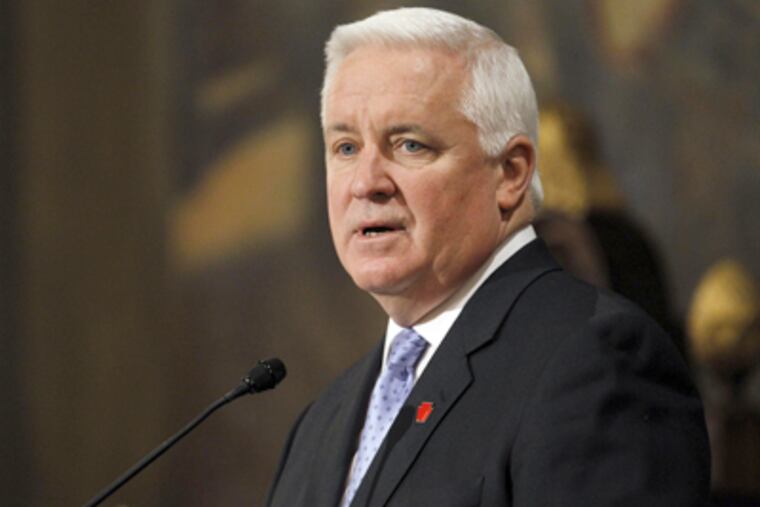Inquirer Editorial: Roads, transit to get help?
With its preliminary recommendations Monday on a workable strategy to keep Pennsylvania roads and bridges repaired, and buses and trains running, an advisory panel to Gov. Corbett proved that sometimes the wrong answer can be the right one.

With its preliminary recommendations Monday on a workable strategy to keep Pennsylvania roads and bridges repaired, and buses and trains running, an advisory panel to Gov. Corbett proved that sometimes the wrong answer can be the right one.
The panel, led by state Transportation Secretary Barry Schoch, endorsed a $2.7 billion annual funding package. It includes lifting a cap on wholesale fuel taxes - a move that likely would bump up the current price at the gas pump by around 5 percent.
Hikes in vehicle-related fees would round out the plan, which also devotes a slice of sales tax revenues to mass transit.
As much as all that makes sense, the fuel-tax proposal could collide head-on with Corbett's pledge of allegiance to the no-tax crowd.
Since Corbett hopped aboard the tea-party bus, he has had to slash state spending in key areas of education and social services. Notably, his first budget steered completely around one massive pothole: the $470 million gap in transportation and transit funding left by the state's failure to move forward on a smart plan to toll I-80.
Schoch's panel may be on to a worthwhile approach - one that could well be a work-around for the governor's no-tax stance. Corbett already has accepted the notion of fee increases to meet other needs. And lifting a cap on the wholesale fuels tax still falls short of a direct hike in the retail gas tax.
Certainly, it's the right move to lean more heavily on broad-based revenue sources so that all highway users share in the cost of maintaining roads. More importantly, the state must attack a backlog of unsafe bridges that is the nation's largest. Transit needs were well-documented by federal transit administrator Peter Rogoff's recent tour of crumbling SEPTA facilities, during which he found huge flakes of rusted steel peeling off a crucial rail bridge girder.
The most straightforward strategy to maintain this crucial infrastructure would be to add a few cents to the retail tax on gasoline. The increase would hardly be noticeable amid normal fluctuations in gasoline prices, but it's still off the table for Corbett and a consistent majority in the Republican-run state legislature.
Given the political climate, Corbett's advisory panel has given Harrisburg lawmakers a good set of tools to make repairs to the state's transportation fund.
In addition, lawmakers and the governor should resurrect the lucrative plan to toll I-80. Local trips on the interstate could still be toll-free, but long-haul I-80 users finally would shoulder their share of transportation costs. Those statewide needs now are met heavily by Pennsylvania Turnpike users in this region - a toll structure that also disadvantages the Philadelphia ports over those in New York.